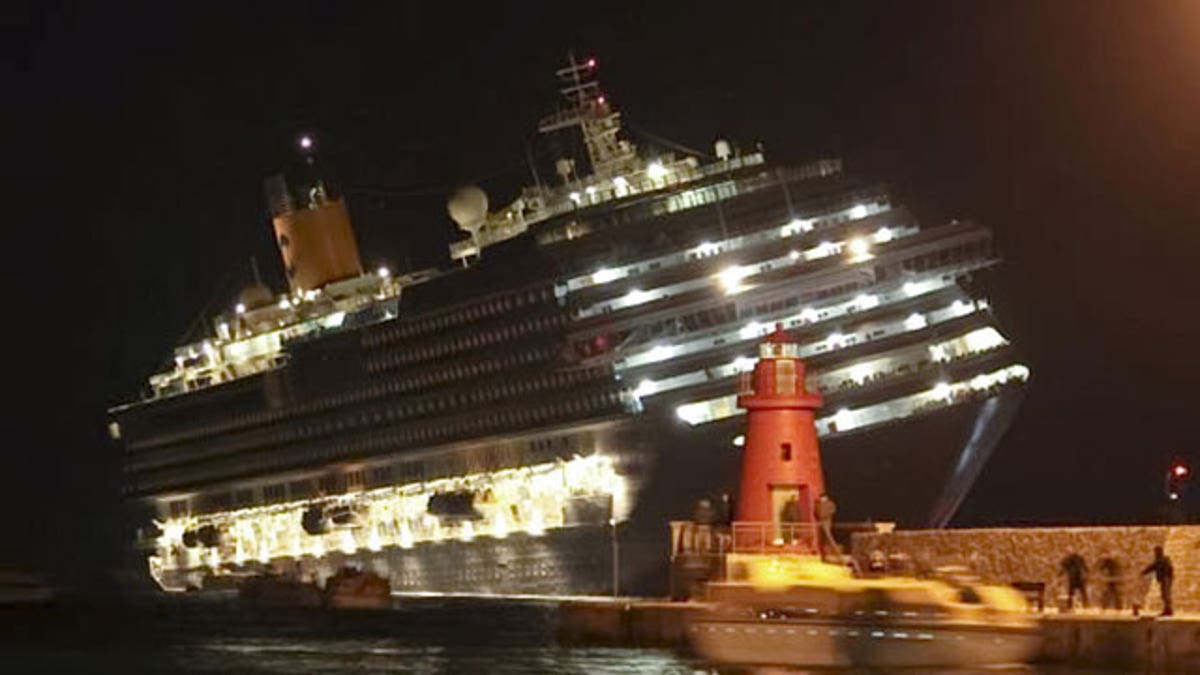
January 14, 2012: The luxury cruise ship Costa Concordia leans after it ran aground off the coast of Isola del Giglio island, Italy, gashing open the hull and forcing some 4,200 people aboard to evacuate aboard lifeboats to the nearby Isola del Giglio island. (AP)
Images of the capsized luxury cruiser off the Tuscan coast are eerily similar to the sinking of the RMS Titanic nearly 100 hundred years ago on April 15, 1912.
Just as similar is the fallout, namely questions about the lack of heroism, especially by the cruiser’s captain. Did he board a lifeboat at the expense of his passengers? Who knows. Italian authorities are holding the captain under suspicion of manslaughter and abandoning ship. A thorough investigation may eventually reveal the truth.
History often repeats itself, especially the chaos following a disaster.
President William Howard Taft lost his top military aid and close friend, Maj. Achibald Butt, aboard the Titanic. After a distinguished U.S. military career in Cuba and the Philippines, Butt served both President Theodore Roosevelt and his successor President Taft at the White House. Butt was so close to Taft for three years that on April 16, 1912, the New York Times described the then-missing Butt, as Taft’s “inseparable companion and friend.”
In 1912 Butt’s health was ailing. Taft suggested he take an extended vacation and go on a special mission to Europe. Butt did both. Traveling to Rome, Italy, he carried a letter to the Pope on Taft’s behalf. After six weeks of rest and relaxation, Butt chose the luxurious Titanic for his return voyage to America.
After the Titanic struck an iceberg, chaos erupted among its 2,224 passengers. Accounts of the disaster suggested that Butt helped women and children board life boats. Years later others contradicted Butt’s heroism by saying he was last seen playing cards in a board room instead. His body was never found. He was one of more than 1,500 who died.
Was Butt a hero when the Titanic sunk? Just as the cruiser catastrophe today shows, the truth is often hard to find. Even with instant news feeds, mobile phone cameras and videos, reports about heroism and lack of heroism paint a contradictory picture. Such is the nature of chaos.
No matter the era, confusion is common in a disaster. History repeats itself. Truth is an unavoidable casualty in catastrophe.
Just last week former Private Jessica Lynch appeared on the FOX News Channel to share her side of the story of her famous capture and rescue in Iraq in 2003. The U.S. government initially claimed that then19-year-old Lynch kept firing her weapon during an Iraqi ambush on her convoy in which she was the lone survivor.
“It would have been so easy for me to go along with their stories. That’s not who I am, not how I was raised. . . I knew I had to set the record straight,” Lynch said, refuting the characterization.
Saying that she never claimed to be the hero people made her out to be, Lynch recalled that she was knocked unconscious and woke up in an Iraqi hospital. A U.S. military team later rescued her.
Thankfully history repeats itself in positive ways, too.
Many islanders of nearby Giglio have opened their homes and businesses to this weekend’s cruise ship survivors, which numbers in the thousands. Just as the Carpathia aided the 700 survivors of the Titanic, so these islanders are showing the compassion that provides hope to those fresh from a disaster.
One Titanic survivor recalled that Butt offered her hope.
". . . this whole world should rise in praise of Major Butt,” said Mrs. Henry B. Harris.
“When the order to take to the boats came he became as one in supreme command. You would have thought he [Butt] was at a White House Reception, so cool and calm was he. A dozen or so women became hysterical all at once as something connected with a lifeboat went wrong. Major Butt stepped to them and said: 'Really you must not act like that; we are all going to see you through this thing.’”
Butt also left a useful legacy. His near daily letters to his sister-in-law Clara have given historians valuable insight into the private side of both Presidents Roosevelt and Taft. (Indeed, I first learned about Butt’s service years ago in 2003, when I read his letters at the Library of Congress through a grant I received from the White House Historical Association to study presidential history).
At Butt’s memorial service, President Taft said, “If Archie could have selected a time to die he would have chosen the one God gave him. His life was spent in self-sacrifice, serving others. His forgetfulness of self had become a part of his nature."
No matter the era. No matter the generation. No matter the disaster. Forgetfulness of self is what turns ordinary people into heroes.
“I know you don’t like to wear the hero label,” Fox News' Shepard Smith told Lynch last week. “but when you go to war and you fight for your country, and you get kidnapped by the enemy and you come home to tell it, you are a hero.”
Award-winning author and historian Jane Hampton Cook, janecook.com, is the co-author of "Stories of Faith and Courage from the War in Iraq and Afghanistan," "What Does the President Look Like?" and others. She is a former webmaster to President George W. Bush.








































